Fear
Body Armor Isn't What Makes You Feel Safe In a War Zone
U.S. troops taught me that inner strength and courage are the best protection.
Posted November 10, 2021 Reviewed by Tyler Woods
Key points
- We develop inner strength and resilience when we leave our comfort zones and learn how to handle uncertainty and face our fears.
- To feel confident, capable and secure, we need to build life skills like resilience, self-reliance and grit.
Before my first military embed, I thought biting the bullet was when I missed drinks before dinner because of a work deadline. I took so many things for granted: comfortable bathroom breaks, brewed coffee, and a safe space to work.
Spending time with U.S. troops gave me a different perspective. They spoke a special language that was more like a code of conduct: getting to work at “zero dark thirty” (early); saying “roger that” (yes) to all assignments; and as you will read below, embracing “the suck.”
Their conscience and character inspired me to find mine.
In honor of Veteran’s Day, here are five military phrases that apply to all of us as we navigate through life’s many challenges.
Embrace the suck (Deal with it)
I had never been on an aircraft carrier before when I found myself in the back of a small plane called the COD (short for: carrier on-board delivery) that shuttled personnel and gear on and off the U.S.S. Constellation, an aircraft carrier stationed in the Persian Gulf.
It was December 2002, three months before Operation Iraqi Freedom and I was reporting for CNN.
We came in for the landing and the aircrewman yelled, “This is it!”
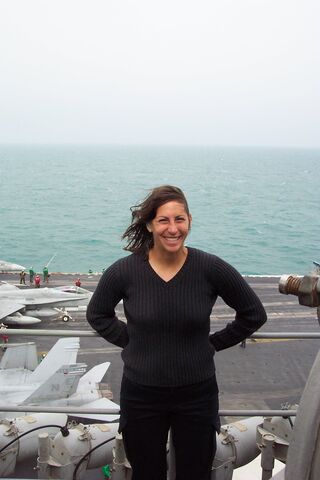
Planes land on a 300-foot runway with enough speed to take off again, in case they miss one of the carrier’s four steel cables. The ship heaved and so did my stomach when the COD’s tailhook caught a cable and we went from 125 mph to zero in 5 seconds.
The carrier was a floating city that never sleeps with 5,000 pilots, sailors, and crew who work 15-hour days. Bathrooms and showers are through the hatch and down the hall so you have to get dressed to get undressed.
I didn’t see anyone take a day off and the only complaint I heard from the crew was when their six-month deployment extended to seven.
“Embrace the suck,” they said. Missing their kids’ birthdays and facing daily danger was their job description.
Go balls to the wall (Go all out)
Aircraft carriers travel with warships for protection. Going balls to the wall was the default on every ship.
The expression has nothing to do with male anatomy. It refers to the knob, or ball, on top of the plane’s throttle that a pilot pushes forward to the firewall of the plane, to go maximum speed.
A few days before the war started, in March 2003, I flew in a helicopter ("the bird") to a guided-missile destroyer, the U.S.S. Milius.
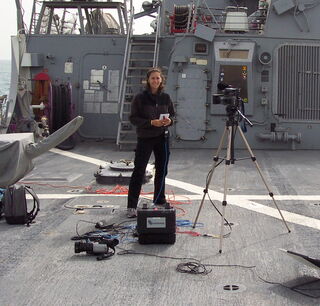
I bunked in a small compartment with the enlisted women. We slept in stacked spaces that were more like slots, with no room to sit up.
“It’s time!” a sailor said as she shook my shoulder at 2:00 a.m. on March 20. “We’re going to war.”
I stumbled through the ship’s hatches with cases of gear. I shot video of vertical launch systems sending Tomahawk missiles with one-thousand pounds of explosives to targets in Iraq.
A few hours later, I connected a cable from my video camera to a phone that sent a signal to a satellite. The signal went to CNN in Atlanta and then into your living room.
I had to keep the signal aligned with the satellite as the ship turned. I carefully pushed the transmission equipment with my foot as I held a microphone in my hand and reported live.
CNN’s head of talent called me around 5:00 p.m. I couldn’t wait for him to tell me how amazing I was.
“What’s wrong with your hair?” he asked. “You look like a poodle. And find some lipstick.”
Going balls to the wall didn’t give me a chance to find the ship’s greenroom and get my makeup done, but I realized that I could do so much more than I imagined.
FUBAR (F*cked up beyond all recognition)
Things went well. Until they didn’t.
When life gets so messy, it can become FUBAR.
While embedded on the U.S.S. Constellation, I had interviewed a pilot for a story.
Men like him didn’t exist anywhere on my personal radar. I was from suburban New Jersey where guys talked about the Dow and NASDAQ, not kill zones and missiles.
I was on and off the carrier for assignments and we spent time together, eating dinner or hanging out in his squadron’s ready room, where pilots prep for flights.
I emailed my best friend Austyn and asked, “Should I sleep with him?” She replied, “DO IT FOR AMERICA.”
One evening, the pilot asked me, “Want to sneak onto the flight deck with night vision goggles?”
Needless to say, I’m a patriot.
The pilot looked great on paper, but there were many red flags. I ignored them all and married him.
It was my biggest wrong turn in life. I course-corrected when I left him.
I drove to my parents’ house in New Jersey and quit my job as a local news reporter in Washington, D.C., where we had lived.
I was single, childless, homeless, and jobless.
Finding my way out of something so FUBAR taught me to give myself grace. But it wasn’t easy in the moment.
Bite the bullet (Accept hardship with courage)
I celebrated my 40th birthday, alone, with a bottle of red wine.
I sobbed. I screamed. And then I did what humans have evolved to do. I endured.
I took a New York City television production job. I dove into work and pitched a series on soldiers heading to Afghanistan.
I profiled a single mom who was leaving her five-year-old son for the third time.
“Leaving your child is not an easy thing to do,” she told me through tears.
There was a special forces dad who worried he wouldn’t live to see his three young kids grow up.
“You always make plans for when you’re coming home,” he said. “But we don’t know if we’ll come home.”
These soldiers showed me how to face fear with fortitude and mental toughness.
Get squared away (Good to go)
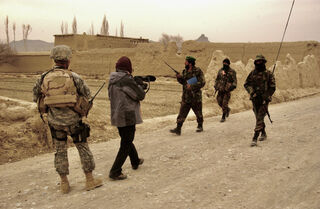
In a decade of war reporting, I lived a lifetime. I had seen the best of people in the worst of situations.
Where there was hardship, there was help. At times, I was the receiver.
I had spent time in Afghanistan with National Guard soldiers. I met a sheriff, an attorney, and a salesman who'd each put their civilian lives on hold to serve for 15 months in a small forward operating base by the Pakistan border.
They always made sure I was squared away: never letting me walk more than an arm’s length away, in case I needed protection; leaving me coffee for my 3:00 a.m. live shots; and giving me clothes so I didn’t die of hypothermia when the base’s generator died and the temperature dipped below zero.
In Iraq, I saw soldiers act like saints. Army medics made house calls to help Iraqi civilians. U.S. troops risked their lives and limbs to serve our country, in the hopes of creating a safer world, even if things ended up FUBAR.
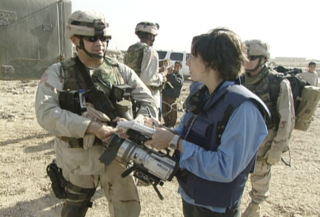
A new perspective
Through their language, I absorbed military values.
I learned how to walk with fear. To place passion and purpose ahead of dollars and cents. To find a way to overcome.
Fifteen years later, when I wait on line in Starbucks, no one knows I used to wear body armor.
But what I learned from U.S. troops is still with me.
I have a nine-year-old son and I want him to be brave. I know that if he can learn to embrace the suck, go balls to the wall, bite the bullet and survive situations FUBAR, he’ll be squared away.
Sum It Up
What truly protects us in life is our inner strength. Our ability to handle situations. To venture into the unknown. To fail, learn and try again. Our courage, confidence, resilience and moral compass are real-life superpowers that don’t come from staying in our comfort zone or from reading a book about grit. They come from taking risks. From struggle.
To all those who choose to serve in the military, thank you! G-d bless you and your families.
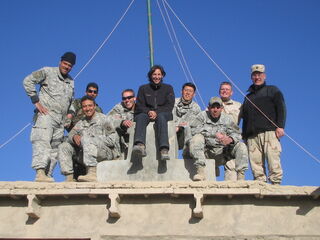
3 ways to thank U.S. Troops
- Send a care package. When I was with troops in Afghanistan, they appreciated the handwritten letters and heartfelt gifts that kids and families sent. Soldiers’ Angels organizes donations.
- Get involved with the USO. The United Service Organization (USO) helps deployed troops and their families by providing various services and activities like airport hospitality centers and USO entertainment tours.
- Help wounded warriors. Organizations like the Wounded Warrior Project support troops wounded by war with their adaptive sports and physical health and wellness programs.




